Share
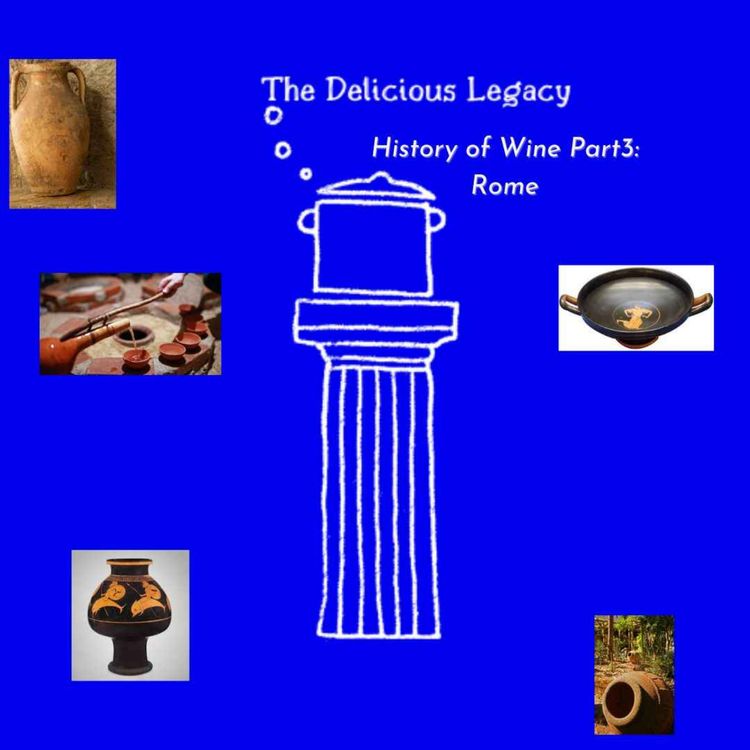
The Delicious Legacy
History of Wine Part Three - Ancient Rome
Hello!
"...For filled with that good gift
suffering mankind forgets its grief; from it
comes sleep; with it the oblivion of the troubles
of the day. There is no other medicine for misery."
Wine. More than medicine. More than nourishment. A gift from the Gods...
Though wild grapevines have grown on the Italian peninsula since prehistory, historians are unable to determine precisely when domestic viticulture and winemaking first occurred.
The earliest recorded evidence of Greek influence dates to 800 BC. Viticulture was widely entrenched in Etruscan civilization, which was centred around the modern winemaking region of Tuscany.
For most of Rome's winemaking history, Greek wine was the most highly prized, with domestic Roman wine commanding lower prices. The 2nd century BC saw the dawn of the "golden age" of Roman winemaking and the development of grand cru vineyards (a type of early first growth in Rome). The famous vintage of 121 BC became known as the Opimian vintage, named for consul Lucius Opimius. Remarkable for its abundant harvest and the unusually high quality of wine produced, some of the vintage's best examples were being enjoyed over a century later.
For the most part wine was fermented in sealed amphoras. Small holes permitted carbon dioxide to escape during fermentation, but after the process was complete they were blocked up. The wine was not always racked or filtered and when it was not it was syphoned or run through a sieve as it was poured out to be consumed.
Cato recommended drying grapes in the sun for two to three days, while Virgil advised a different means to the same end of increasing sugar content: leaving grapes on the vine until they were exposed to frost. The products of Virgil’s method were the forerunners of modern late- harvest wines.
Cato also said that during the thirty days of fermentation the insides of wine jars should be regularly scraped with brooms made of elm twigs to stop the dregs sticking to the sides. This process was the equivalent of batonnage and other methods of ensuring that the less stay in contact with the must during fermentation. Depending on the grapes used, it should have ensured a darker and more tannic wine. The jars were then sealed until spring when the wine was racked off into clean amphoras for ageing.
Cato provided several recipes for *Greek', 'Coan' (that is, from Cos) and other wines, including this one which he described as suitable 'for the hands
to drink through the winter:
Pour into a jar ten quadrantals of must, two quadrantals of sharp vinegar, two quadrantals of boiled must, fifty quadrantals of fresh water. Stir with a stick thrice a day for five consecutive days. Then add sixty-four sextarii of old sea-water, cover the jar, and seal ten days later. This wine will last you until the summer solstice; whatever is left over will be a very sharp and excellent vinegar.
That and a lot more on this weeks episode!
Enjoy!
The Delicious Legacy
More episodes
View all episodes
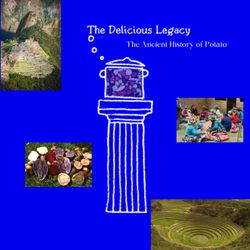
17. The Ancient History of Potato in the Andes
01:00:39||Season 6, Ep. 17Hello and welcome back to another culinary adventure my curious and hungry archaeogastronomers!How, when and why the first potatoes were domesticated? Who were the people who did it?The tough, inhospitable terrain, the extreme climate and the improbably high altitude plateau of the Andean altiplano is the home of the potato. A tuber that was a staple of the diet of the Andean people for thousands of years; then went not only to conquer the world, but be the friend of peasants, farmers, poor people too and save millions from starvation around the world! How did that come about? And what was the genius systems of the Incas that helped grow this amazingly tasty and nutritious food?Let's find out on today's epic adventure!Recommendations for the week:The Puratos Sourdough Libraryhttps://www.questforsourdough.com/puratos-libraryPeople | Planet | Food, a Scigest podcast series exploring the intersection of sustainability, agriculture, and our global food system.https://www.plantandfood.com/en-nz/people-planet-foodCradle of Gold:The Story of Hiram Bingham, a Real-Life Indiana Jones, and the Search for Machu Picchuhttps://www.christopherheaney.net/cradle-of-gold/descriptionEnjoy!The Delicious Legacy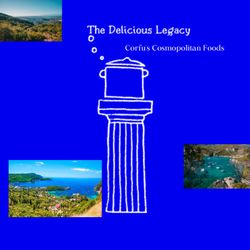
16. Corfu's Cosmopolitan Foods- Byzantium, Venice, Jewish and English
31:23||Season 6, Ep. 16Hello!The island of Corfu was legendary since the homeric times for it's agreeable climate and the lush green forests. Food was abundant and the inhabidants wealthy.So what's the traditional food of Corfu and the influnces in the island?And how come and it has over five million olive trees and almost a million of them centuries and centuries old?Let's find on todays episode!With music from Pavlos KapralosThe Delicious Legacy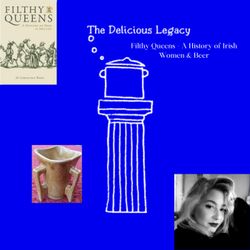
15. Filthy Queens - A History of Irish Women & Beer
52:39||Season 6, Ep. 15Hello!In today's episode we have an Interview with Dr Christina Wade, author of the newly released book "Filthy Queens - A History of Beer in Ireland."Irish stories, myths and legends are full of spirits and ghosts. The history of beer in Ireland is no different; many of these shadowy echoes are still reverberating in the modern brewing history. Beer and ale can bring us together, and importantly understand the past, our past, better, as well as bring us closer to our ancestors, who also drunk beer. And they did so to celebrate, commiserate and of course to socialise with friends and family just as we do.But beer has a secret. For centuries, women brewers remained key participants in the beer trade, up to the Industrial Revolution when increased mechanisation, alongside Victorian societal constraints, conspired to push a lot of them out. This was true in England, and many other places and it is no different for Ireland. Saints, nuns, wives, queens; the stories of Irish women and ale are countless.Join me today as I talk with Dr Christina Wade about her latest book Filthy Queens A History of Beer in Ireland, to find out more of the amazing history of women brewers of the Emerald Isle!You can buy the book here:https://ninebeanrowsbooks.com/en-gb/products/filthy-queensand Dr Wades substack: https://substack.com/home/post/p-151378197This week's recommendations:Musician and poet of ancient music Bettina Joy De Guzman:https://www.bettinajoydeguzman.com/https://www.youtube.com/@bettinajoydeguzman1981The Ancient Crops We've Forgotten How to Grow:https://www.youtube.com/watch?v=VjFT4PC8YIQ&t=3sJonny Garrett:https://www.goodbeerhunting.com/authors/jonny-garretthttps://www.waterstones.com/book/the-meaning-of-beer/jonny-garrett/9781838959944Enjoy!Much love,Thom & The Delicious Legacy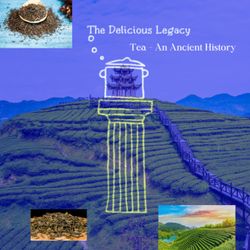
14. Tea - An Ancient History
40:35||Season 6, Ep. 14"The monks say the divine flavour befits quiet seclusion.The abundant fluttering leaves become a welcome guest.They would send a package to my prefectural office,But the brick well and copper stove would ruin itscharacter.Worse yet, the spring teas from Meng Mountain andGuzhuSealed in white clay, stamped in red, they travel dustyroads.If you want to know the pure cooling taste of milky buds,You must be one who sleeps in clouds and squats on rocks."These are the words of the early ninth-century poet Liu Yuxi. After drinking tea with Buddhist monks on a mountain, Liu contemplates the tragedy of taking a parcel of tea home with him...Hello! Welcome back to another episode of The Delicious Legacy, my hungry and curious archaeogastronomers!I'm Thom Ntinas and this is a short history of Tea. The world's most thirst-quenching liquid after water!Enjoy!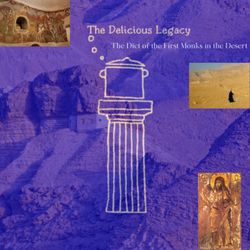
13. The Diet of the First Desert Monks
01:07:52||Season 6, Ep. 13Lenten fasting became law at the Council of Aix in 837AD. Charlemagne was determined to see that it was observed, by force if necessary. Any baptised Lombard or Saxon chieftain who failed to do proper penance had his head cut off, an uninviting prospect for any budding Christian!Hello,Enjoy this updated version of an older episode about feasting and fasting in the desert nearly 2000 years ago from the first Christian fathers, the monks who made the religion of Christianity what it is.How did they live, survive and thrive? What did they eat? And how this strict lifestyle evolved to monasticism as we know it in Europe medieval period?All the above and much more, with recipes from the past in this updated marathon episode!Enjoy!Music by Pavlos KapralosThe Delicious Legacy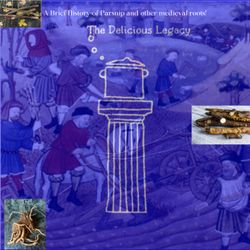
12. A Brief History of Turnip (And other Medieval Root Vegetables)
32:17||Season 6, Ep. 12Hello!How did the ancient Greeks and Romans ate turnip? And what was the position of this vegetable at the dinner table? How important was it?And what the heck is a skirret, how do you cook it and why did we stop cultivating it on a large scale?All this and more on this weeks episode!This week's recommendations areA is For Apple Podcast:https://podcasts.apple.com/gb/podcast/s2e2-b-is-for-buttery-bistro-bournville/id1743840806?i=1000691341726Kentwell medieval gardenshttps://www.kentwell.co.uk/Charlie Taverner Street Foodhttps://charlietaverner.com/street-food/Chiara Vigo: The last woman who makes sea silk:https://www.bbc.co.uk/news/magazine-33691781Music on this episode by Pavlos Kapralos and Miltos BoumisEnjoy!Much love,Thom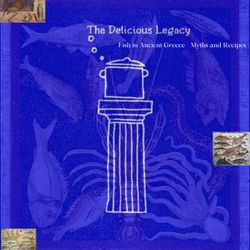
11. Fish in Ancient Greece - Myths and Recipes
33:36||Season 6, Ep. 11Hello my lovely archaeogastronomers!A new episode is out!"Aedepsus in Euboea, where the baths are, is a place by nature every way fitted for free and gentle pleasures, and withal so beautified with stately edifices and dining rooms, that one would take it for no other than the common place of repast for all Greece. Here, though the 'earth and air yield plenty of creatures for the service of men, the sea no less furnisheth the table with variety of dishes, nourishing a store of delicious fish in its deep and clear waters."So Plutarch tells us in his book, Moralia.How much fish did the ancient Greeks eat? Was it popular? Expensive? What are the surviving recipes?Let's explore on this episode the story of fish eating in the ancient Greek World!Music by Pavlos KapralosLove,Thom & The Delicious Legacy podcast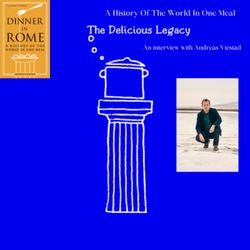
10. Dinner in Rome - A History of the World in One Meal
47:48||Season 6, Ep. 10Hello!A brand new episode for your delight!How does one deconstruct a meal to it's historical components? What is the truth behind the myths of a dish, the stories we tell about its origins, and how interconnected is the world's history with the cuisines, the spices, the ingredients we use on each country of ours?On this episode I interviewed Andreas Viestad, about his book "Dinner in Rome- A History of The World in One Meal". A meal in a restaurant in Rome, can provide all the inspiration that one needs to travel though millennia of human history and across the oceans in search for the ingredients that constitute the meal.Andreas Viestad's book is out now from Reaktion books and you can get it here:https://reaktionbooks.co.uk/work/dinner-in-romeIf you want access to the bonus bits of this episode, please join me on Patreon! www.patreon.com/thedeliciouslegacyMuch love,The Delicious Legacy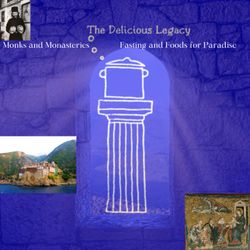
9. Monks and Monasteries: Fasting and Foods for Paradise
39:37||Season 6, Ep. 9Hello!New week, new episode for you!We are soon approaching the period that is in Greek Orthodox (and not only) Church the Big Lent! Forty days of fasting before the Holy Week (more and severe fasting here!) and Easter Sunday.The abstinence of meat and dairy products it's something that the first monks practised; some of them for many years. Slowly, gradually these solemn personal "traditions" of how to step closer to God, Jesus, or saintliness, passed down to the canon of the Church and many monasteries all over the Christian world followed some sort of fasting rules throughout the year. Some with more rigour and fanatical devotion to meagre portions of food than others. So the question I had all this time in my mind was "what did the monks eat throughout the year and where they've found their produce?"Let's explore all this and more on today's episode!Also, this week's recommendations:"Localizing 4000 Years of Cultural History. Texts and Scripts from Elephantine Island in Egypt":https://elephantine.smb.museum/?lang=enWhy 5 Of The World's Priciest Salts And Spices Are So Expensivehttps://www.youtube.com/watch?v=60Myw4fYyBMAbundance London:https://abundancelondon.com/Enjoy!The Delicious Legacy